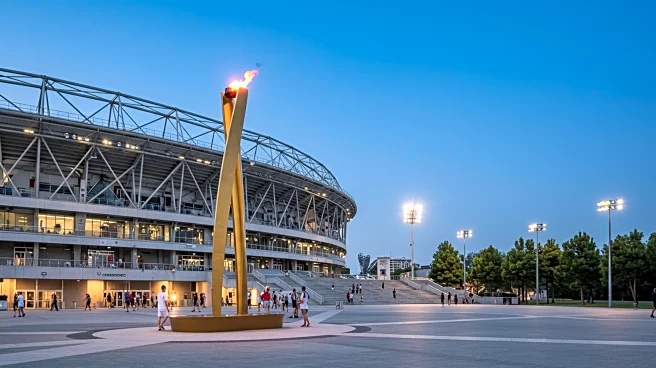What's Happening?
Organizers of the Los Angeles 2028 Olympics have announced a groundbreaking decision to sell naming rights for some competition venues, a move that diverges from traditional Olympic practices. This initiative aims to unlock additional revenue streams by allowing brand names on stadiums and arenas, which has historically been prohibited. LA28 chairperson and president Casey Wasserman stated that this decision is part of a commitment to reimagine the possibilities for the Games, ensuring they are fully privately funded with no new constructions. Contracts have already been established with companies like Honda and Comcast, granting them naming rights for specific venues. Honda will have its name on the Anaheim arena hosting volleyball, while Comcast will name the temporary squash venue. The Peacock Theater in downtown Los Angeles is set to host boxing and weightlifting events. This strategy is expected to generate revenue beyond the existing budget and introduce a new commercial model benefiting the Olympic movement.
Why It's Important?
The decision to sell venue naming rights for the LA 2028 Olympics represents a significant shift in the financial strategy of the Games, potentially setting a precedent for future events. By allowing corporate sponsorships to extend to venue names, the organizers aim to secure substantial funding without relying on public money or constructing new facilities. This approach could influence how future Olympic Games are financed, encouraging more private investment and reducing the financial burden on host cities. The involvement of major corporations like Honda and Comcast highlights the attractiveness of the Olympics as a platform for brand visibility, which could lead to increased corporate interest in sponsoring large-scale sporting events.
What's Next?
The LA28 organizers plan to offer naming rights for up to 19 temporary venues, with opportunities available to both IOC sponsorship partners and LA28 partners. Companies with existing naming rights at venues like SoFi Stadium and Crypto.com Arena will have the option to maintain these rights during the Games. Despite this commercialization, 'clean venue' policies will still be enforced, ensuring no advertising appears on the field of play. The success of this initiative could prompt other Olympic host cities to consider similar strategies, potentially transforming the financial landscape of the Games.
Beyond the Headlines
This development raises questions about the balance between commercialization and tradition in the Olympic Games. While the financial benefits are clear, there may be concerns about the impact on the cultural and historical aspects of the Olympics, which have traditionally emphasized non-commercial values. The decision could also spark discussions about the role of corporate influence in sports and the potential implications for the integrity of the Games.










